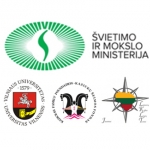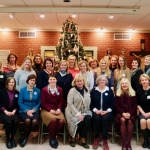News
On March 25, 2017, one hundred sixty-eight Lithuanian Heritage Schools students from the US and Europe took a Lithuanian Language Proficiency Test. The test and its creation serves as one good example of the benefit of the Global Lithuania initiative: a collaboration between Lithuanians in the diaspora and in Lithuania.
The goal of this test is to document various proficiency levels that a student has achieved in use of the Lithuanian language. Reading, writing, listening and conversational skills are all evaluated. Such proof can be presented to other educational institutions and this test evaluates language proficiency level according to guidelines developed in the "Common European Framework of Reference for Languages: Learning, Teaching, Assessment" (CEFR). Students who pass a given level of the proficiency test receive a corresponding certificate from the Vilnius University Lithuanian Studies Department.
The currently used test was put together by a team that included Joana Pribusauskaite, Elvyra Kutanoviene, Rita Migauskiene, Virginija Stumbriene, and Lina Vaskeviciene, all from the Vilnius University Lithuanian studies department.
The need for such a Lithuanian language proficiency test was raised several years ago. The project was born during long discussions led by its initiators Neila Baumiliene, the Kazickas Family Foundation New York office director, and Gaila Narkeviciene, principal of the Boston Lithuanian School. They had been communicating the need for these tests to different departments at various Lithuanian institutions and searched for experts to develop the tests. In an initial stage of the project, the Ministry of Education and Science ordered development of an A2 level test. The test was field-evaluated by students at the Boston Lithuanian School. After reviewing the testing experience and results, it was decided to make a test that included more than a single level of proficiency. During the next stage, a test assessing 3 proficiency levels (A1, A2, B1) with the A1 and A2 level reserved for beginners.
Even though the skills of students attending Lithuanian schools in the U.S., differ from those who are starting to learn Lithuanian with no previous experience with the language, the language skills of heritage speakers often are still limited due to lack of situations where Lithuanian can be spoken. According to the testing scheme, B1 level language users (called Threshold or Intermediate users) are known as independent users. With a help of basic language tools they can communicate in Lithuanian in various everyday life situations. A new test targeting this level of proficiency was prepared by the Vilnius University Lithuanian Studies department, with consultation and coordination by Gaila Narkeviciene on behalf of the Lithuanian Educational Council of the USA. The B1 level test was financed by the Ministry of Education and Science and supported by the Vilnius University Language Studies department.
Only examiners with special training can test students at the A1-B1 proficiency level. For that reason, on January 29-30, 2016, a training seminar for examiners was held at the Boston Lithuanian school. During the training, qualified teachers were taught how to best administer the speaking part of the test, as well as the main test. Implementation factors and future trial tests were discussed. These seminars were taught by Joana Pribusauskaite and Rita Migauskiene, and expenses of the serminar were covered by the Kazickas Family Foundation, a nonprofit that has been contributing to Lithuanian education for many years.
In February, the first trial A1-B1 proficiency level test was administered to 76 students, coordinated by G. Narkeviciene. This was followed by similar trial tests given in many other Lithuanian schools across the USA. After reviewing the results and feedback, and making some adjustments, an official proficiency level test was finalized and was administered on April 16, 2016 at seven different testing centers across the USA. Eighty nine students from eleven Lithuanian Heritage schools participated. Soon afterwards, Lithuanian schools in Europe also expressed interest in such tests. In that same year, on November 25-26, the Ministry of Education and Science, together with the Vilnius University Lithuanian Studies Department organized examiner training in Vilnius. This training was again supported in part by the Kazickas Family Foundation. Fifteen Lithuanian language teachers from schools in Ireland, Great Britain, USA, Norway, France, Russia and Sweden participated. They were introduced to language proficiency level structure, and learned how to test students, especially how to administer the speaking part of the test.
With a goal of ensuring continuing professional examiner training and development, on January 13-15, 2017, a continuing education seminar was organized again in Boston. One part was designed to help previously trained examiners advance their skills, and another part was aimed at new qualified teachers. Vilnius University Lithuanian Studies Department specialists Joana Pribusauskiate, Loreta Vilkiene, Rita Migauskiene and Lina Vaskeviciene provided the training. The seminar was organized by Gaila Narkeviciene, Boston Lithuanian School Principal, and financed by the Kazickas Family Foundation, the Lithuanian Educational Council of the USA and the Vilnius University Lithuanian Studies Department. Thirty teachers from Lithuanian Heritage Schools in Boston, New York, San Francisco, Chicago and other cities participated in order to expand their knowledge in this area. All of the participating teachers met qualifications to administer the tests at the conclusion of the seminar.
Teaching Lithuanian language as foreign language is a very important part of the Vilnius University Lithuanian Studies Department’s work. Accordlingly, lecturers provided an additional seminar to those interested in the most effective ways to teach Lithuanian language abroad. Suggestions were provided regarding how to create guidelines and teaching goals, how to plan language courses and individual lessons and how to develop language activities. Participants actively engaged in sample grammar and vocabulary lessons and discussed various issues that they had encountered while teaching.
After several conversations with colleagues from Lithuanian Heritage schools, it is clear that there is a need to continue examiner training, so that only qualified specialists would be administering these proficiency tests. Also, there should be certain teaching resources available for the candidates interested in going through the training, resources that would provide Lithuanian language teachers with testing format guidelines, assignment samples and testing schedules. Students graduating from Lithuanian Heritage Schools are not the only ones who need Lithuanian language proficiency level certificates. Individuals who graduated previously, in some cases students who now are enrolled in Universities, or even non Lithuanian heritage individuals, could also benefit from having such certificate documentation of their Lithuanian language ability. There is a need to organize even higher level (B2 and C1) language proficiency tests for individuals 17 years and older. Testing centers need to be established, preferably close to the Lithuanian consulates, so that confidentiality of the tests and identical testing conditions can be secured. In other words, there should be a consistent Lithuanian as foreign language testing system for both, adults and school age children.
Text based on Vilnius University Lithuanian Language Studies Department information
Photo: Aiste Solly
|


